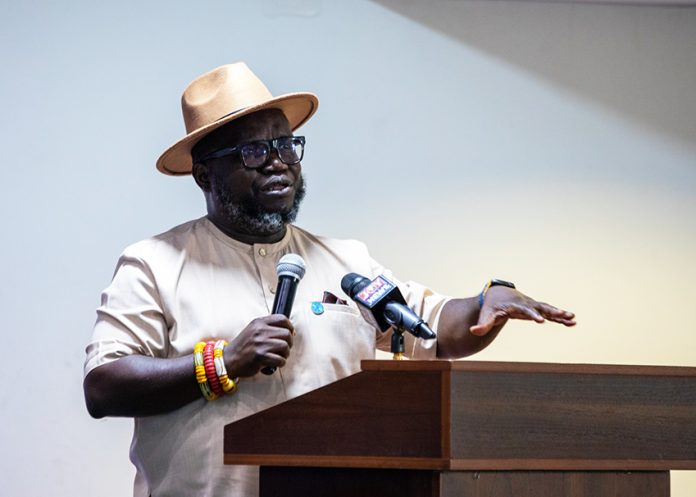The Coalition Against Galamsey (CAG) has issued a strong condemnation of the government’s handling of illegal mining activities, warning that Ghana may be teetering on the edge of environmental and economic collapse. The group has called for immediate and decisive action to address the worsening crisis of galamsey—the term widely used for illegal and irresponsible small-scale mining in the country.
In a press statement shared with The Chronicle, CAG expressed disappointment in what it called a “troubling posture” adopted by the current administration toward galamsey, accusing government officials of being inconsistent, lenient, and at times enabling the environmental destruction taking place across the country.
Government’s Silence and the President’s Recent Remarks
The Coalition particularly criticised President John Dramani Mahama’s recent remarks during a media engagement at Jubilee House on September 10, 2015 describing them as dangerously permissive and counterproductive. The Coalition believes these comments, whether made knowingly or inadvertently, undermine national efforts to curb illegal mining.
According to the CAG, such statements risk legitimizing illegal operations and embolden those responsible for the ongoing environmental degradation. The Coalition argued that the President’s tone failed to reinforce a firm stance against illegal mining and instead could serve to reverse years of public education and political messaging aimed at discouraging the practice.
The group called the president’s rhetoric “deeply unfortunate and regrettable,” noting that it creates room for impunity and dilutes the urgency needed to confront the crisis.
The Current State of Environmental Emergency
CAG painted a dire picture of the country’s current environmental state. The group pointed out that over 20 million Ghanaians now depend on water sources that are severely polluted due to illegal mining operations. Additionally, Ghana has witnessed the destruction of more than 50 forest reserves, with severe consequences for climate security and biodiversity conservation.
The impact on agriculture is equally alarming. Fertile farmlands, particularly those used for cocoa, rubber, and oil palm cultivation are being lost at an increasing rate. Many farmers, according to the Coalition, are struggling to find arable land to continue their livelihood, a situation that threatens national food security and export earnings.
Perhaps most alarming is the potential impact on public utilities. The Ghana Water Company Limited (GWCL) has requested a 280% increase in water tariffs, citing the rising cost of treating polluted water caused by mining activities. According to the Coalition, this request is not merely a financial appeal but a reflection of catastrophic failure at the state level. Ghanaian citizens, it says, are being forced to bear the cost of a crisis they did not create.
The Breakdown of Water Infrastructure
The degradation of water quality has already led to the near-collapse of some treatment facilities. The Kwanyarko Water Treatment Plant, for instance, has reported a turbidity level as high as 32,000 NTU, far exceeding the acceptable standard for safe water treatment. Similarly, the Bunso Water Treatment Plant has remained closed for nearly a year, unable to operate due to extreme pollution. In Kyebi, the water facility runs at minimal capacity and experiences frequent shutdowns.
These developments, according to CAG, signify not just an environmental emergency, but a looming public health and economic disaster. The group warned that if the situation is allowed to persist, Ghana risks losing its ability to provide even basic public services.
Calls for a State of Emergency
The Coalition has renewed its call for a State of Emergency to be declared in regions most affected by galamsey.
Citing Article 31(9) of the 1992 Constitution, CAG noted that the law allows for the declaration of a state of emergency when essential services such as access to potable water, are under threat. The actions of illegal miners, the group argued, have effectively deprived large communities of clean water, thereby meeting the constitutional threshold for emergency powers.
CAG stated unequivocally that Ghana has moved beyond the “last resort” phase, and that only the swift implementation of emergency protocols can salvage the nation from further deterioration. The group urged President Mahama to present a detailed action plan, with clearly defined timelines and milestones, to assure the public of government’s genuine commitment to ending the crisis.
Accountability at the Local Level
Referring to the President’s earlier commitment to dismiss any Municipal or District Chief Executive (MCE/DCE) under whose watch illegal mining continues, CAG insisted that this must not be an empty threat. The Coalition called on the President to follow through by dismissing and investigating such local officials for possible complicity.
The same level of scrutiny, it added, should be extended to district-level police commanders and officers of the National Intelligence Bureau (NIB) operating in mining-endemic areas.
Funding and Resourcing Enforcement Agencies
While acknowledging the establishment of the National Anti-Illegal Mining Operations Secretariat (NAIMOS) as a step in the right direction, CAG stressed that without adequate funding, it will not achieve its intended impact. The Coalition proposed two primary funding mechanisms to support NAIMOS:
First, it suggested that a portion of the proceeds from the Ghana Gold Board (GoldBod) should be earmarked for the operations of NAIMOS. Second, it recommended that excavators and machinery seized during anti-galamsey operations be auctioned at a discounted rate, with the proceeds allocated to joint enforcement efforts between the Forestry Commission and local police units.
The Role of the Ghana Police Service
The Coalition reiterated that while NAIMOS is a key coordinating body, the Ghana Police Service remains the primary state agency responsible for enforcing laws against illegal mining. CAG urged the government to fully equip and empower district-level police stations with the necessary personnel, training, and logistics to execute sustained enforcement.
Furthermore, CAG called on the Inspector General of Police (IGP) to address longstanding issues of corruption and complicity within the ranks of the police, which it says have significantly hampered progress in the fight against illegal mining.
A Nation at a Crossroads
“This is no longer just an environmental challenge; it is a test of national integrity. If we continue to sacrifice our rivers, forests, and farmlands for short-term gold profits, we are trading away our future. We must ask ourselves—what kind of country are we building? And what kind of government allows this level of destruction to persist unchecked?”
The Coalition called on citizens, traditional leaders, civil society, the media, and all political actors to hold the government accountable and demand swift, transparent, and sustained action to end the galamsey menace once and for all.









